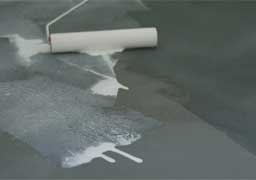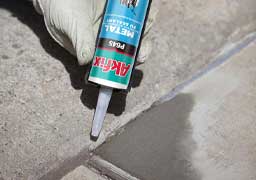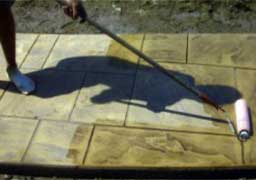Concrete Sealers
Concrete is a strong and durable material on its own but when combined with a sealer it is not only strong but also protected. Sealers are essential to protect the concrete from water damage, stains, oils and grease, and much more! Installing the masterpiece of your dreams isn’t complete without sealing the surface to protect it for years to come.
Concrete sealers keep your concrete looking its best and prolong the life of your concrete whether it’s a pattern-stamped patio, stained pool-deck, or exposed-aggregate. Sealers are wonderful for restoring beauty in concrete that has wear and tear and prolongs the life of your concrete as well.
Concrete sealers keep your concrete looking its best and prolong the life of your concrete whether it’s a pattern-stamped patio, stained pool-deck, or exposed-aggregate. Sealers are wonderful for restoring beauty in concrete that has wear and tear and prolongs the life of your concrete as well.
Benefits of Concrete Sealers
Concrete sealers are perfect for not only protecting the concrete but restoring concrete that isn’t looking its best. Sealers offer protection from various things such as oil stains, tire marks, fading, water damage, or even just dirt and mud. Sealers preserve the surface of the concrete prolonging the life of the concrete while enriching the surface making it look its best. Sealers are the ultimate protection against many elements like scuffs and scratches from foot traffic or more natural elements like moisture control. The benefits of concrete sealers are why it is important to use sealers to prolong the life and beauty of your concrete surface.
Old Concrete Vs New Concrete
When you look into sealing your concrete you math be wondering what is best or if it’s even possible between old and new concrete. For most sealers, it is best to apply when the concrete has been allowed to fully cure for the 28 day period. While it is best to wait for the concrete to be fully cured there are some sealers that can be applied as soon as the concrete can support the weight of a person. You can seal fresh concrete after pouring as long as the bleed water has evaporated from the surface. Existing concrete can be sealed at any time to bring the look of old concrete back to life. Some concrete sealer manufacturers have specific formulas for older concrete that caters to older, more porous concrete. If the concrete has an existing layer of sealer on it, it may need to be removed before the new layer of sealer is applied. Without an existing sealer, the concrete just has to be thoroughly cleaned and cracks filled for a great look.
Types of Concrete Sealers
Concrete sealers are important to protect your concrete and ensure that it lasts as long as it is intended. Not only will these sealers protect the concrete, but they increase their beauty as well. When you decide to seal your concrete it is important to understand the different types of sealers that are available to you.
Free Quote
Fill out this form and someone from our team will be in touch with you shortly.

Acrylic Concrete Sealers
Acrylic sealers are the most common concrete sealers on the market and the most preferred in the industry because of both low costs and easy application. This coating option can be applied soon after the concrete installation and is mostly known for protecting against ultraviolet rays. This sealing option works well against moisture and other liquids despite being thin because it doesn’t let anything slip through the cracks. This type of sealer comes in both a water-based and solvent-based type that is beneficial in its own way. Acrylic sealers can be used to protect and bring out the best in both indoor and outdoor surfaces and generally only take around an hour to dry.

Polyurethane Sealers
Polyurethane sealers are twice as thick as acrylic sealers and offer protection for your concrete while ensuring durability. This type of sealer comes in both water-based and solvent-based that each has its own benefits and specifics. Polyurethane sealers are abrasion-resistant and are great for areas that have heavy foot traffic like walkways. This sealer is ideal for decorative concrete and will protect without yellowing or discoloring the surface. Polyurethane sears are great for many different areas while lasting 3-4 years before needing to be reapplied.

Penetrating Sealers
A penetrating sealer is absorbed into the concrete to prevent moisture from coming in while at the same time allowing vapor out. Despite being a penetrating sealer, this type of sealer does not change the appearance of the concrete so it provides invisible protection. These sealers have flexibility so they can be great for use on many different concrete surfaces offering protection against erosion, staining, weather, UV rays, and extreme temperatures. Penetrating sealers are preferred over other sealers when it comes to walkways and driveways because they won’t cause the concrete to become slippery and it can maintain its safe properties. This sealer is only suitable for outdoor concrete sealing and involves careful application because if the surface is exposed to water or moisture it will bubble and foam after the sealer application.
Silicate, Silicone, and Silane Sealers
These types of sealers aren’t as common but still requested for some concrete sealing jobs. Silicate sealers are great if you are looking to harden your concrete surface, but they won’t offer water erosion protection. Silicone sealers are great for protecting the beauty of your concrete but are designed to be short-term. This sealer is designed for use on concrete that needs frequent cleaning or is exposed to graffiti as a layer of protection. Silane sealers involve a thick application of usually 2-3 coats and are found in places such as parking garages. These sealers aren’t good for preserving the concrete color because of the multiple coats that are applied, but they make for a great lasting sealer that is good for up to 8 years.
Call For a Quote:
844-482-8330
Finding the Perfect Contractor
Finding the perfect contractor for your concrete sealing job can be a task, but it doesn’t have to be stressful. Taking it one step at a time you can find the perfect contractor for your concrete sealing job at a great price. Hiring a contractor for concrete sealing is important to ensure that the process is not only done correctly but that the right materials are used. Certain concrete sealers are better in some areas than others and some sealers can’t be used in specific areas at all. A professional has the knowledge and experience needed to help you decide what sealer is best while being able to complete the job quickly and at a great rate. When looking for a concrete sealing professional, search your local area for the top-rated contractors through a web search. This brings up many different options for professionals that you can then receive quotes from as well as look through their portfolio. Once you have narrowed your search down, always check for your contractor to be licensed, bonded, and insured to guarantee the job is done safely and by all the proper guidelines as well.
F.A.Q.S
About Stamped Concrete
What surfaces should I make sure to seal?
Exterior concrete is one of the top locations that should be sealed especially in areas that experience freeze/thaw cycles. Even areas of California, Texas, New Mexico, and more are subject to these cycles which can be damaging to concrete surfaces. Sealing your exterior concrete also helps protect the surface as well as keeping it beautiful.
How much does sealing concrete cost?
The cost of the sealer depends on the type of sealer that you choose. For most sealers, it’s generally $0.15-$0.25 per square feet while higher-end coatings can run up to $2.50 per square foot. More often than not, the investment in the right concrete sealer is well worth the expense.
How long will my concrete sealer last?
The longevity of your sealer is dependent on which sealer you choose. Generally speaking, most sealers can last anywhere from 5 to 10 years while some of the other sealers can be expected to last around 1-3 years before needing to be reapplied.
